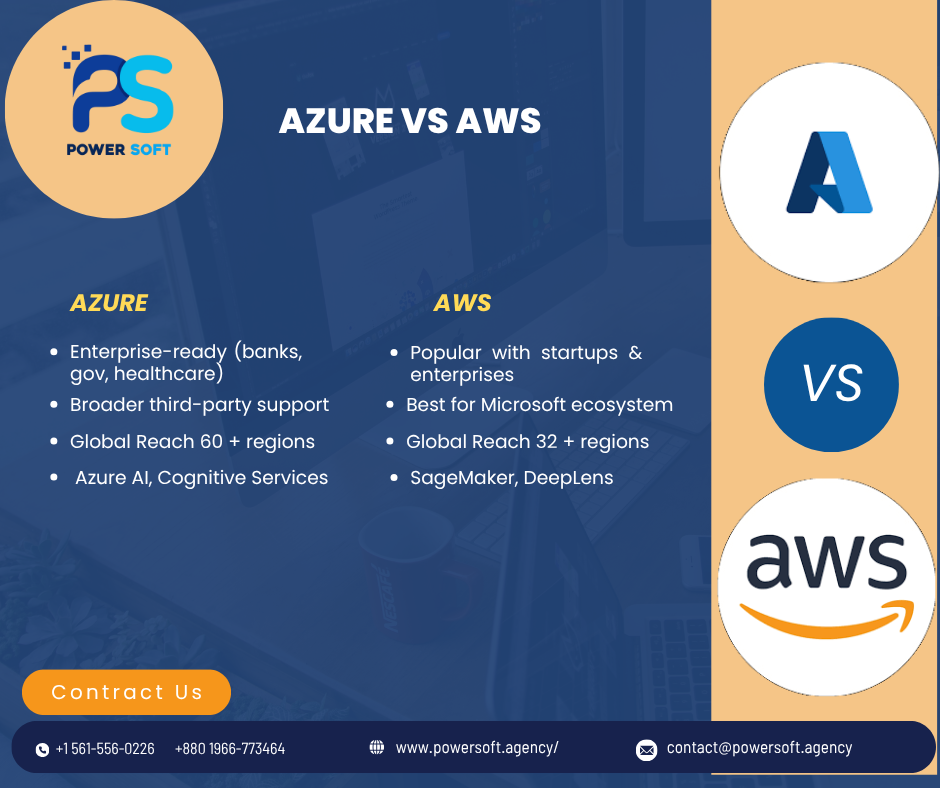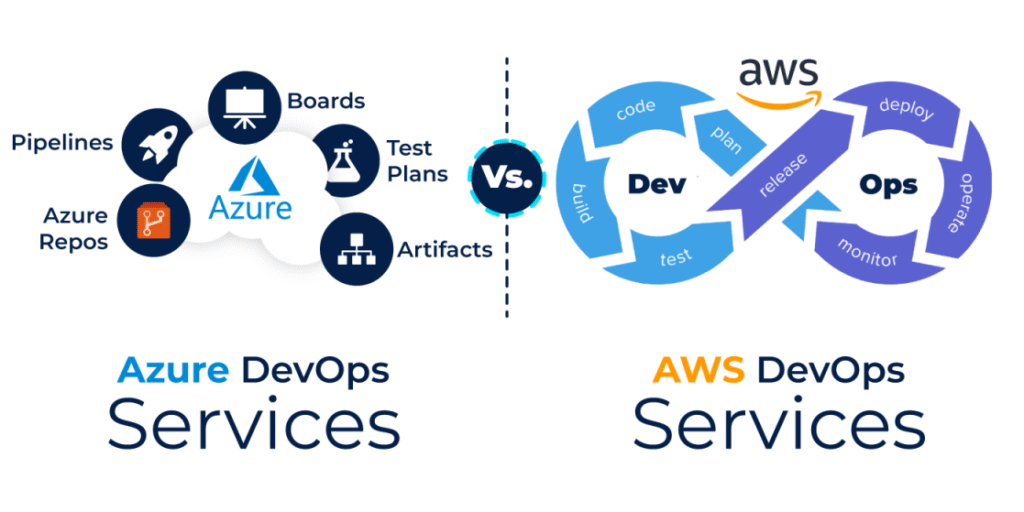
Choosing between Azure vs AWS is crucial for businesses scaling in 2025. Both Microsoft Azure and Amazon Web Services lead the cloud market, but which one fits your needs best?
In this comprehensive guide, we compare Azure vs AWS based on core services, pricing, scalability, performance, and developer support. Plus, discover how Power Soft helps businesses build scalable, future-ready cloud solutions tailored to their goals.
1. Overview: The Cloud Giants at a Glance Azure vs AWS

- Amazon Web Services (AWS): Launched in 2006, AWS is the first and most mature cloud provider with a vast range of services.
- Microsoft Azure: Introduced in 2010, Azure leverages Microsoft’s enterprise ecosystem and is deeply integrated with tools like Office 365 and Dynamics 365.
Both platforms offer Infrastructure-as-a-Service (IaaS), Platform-as-a-Service (PaaS), and Software-as-a-Service (SaaS), making them suitable for everything from startups to enterprises.
2. Services & Capabilities Azure vs AWS

When comparing Azure vs AWS, the breadth and depth of their services are key factors that influence which cloud platform suits your business needs best. AWS currently leads the market with over 200+ services, offering a wide range of solutions across computing, storage, databases, networking, and serverless computing. Popular AWS services include:
- EC2 (Elastic Compute Cloud): Scalable virtual servers for flexible computing power.
- S3 (Simple Storage Service): Reliable and secure object storage for unlimited data.
- Lambda: Serverless computing that runs your code in response to events without provisioning servers.
- RDS (Relational Database Service): Fully managed relational databases with easy scalability.
Microsoft Azure offers a comprehensive portfolio with 100+ services, emphasizing seamless hybrid cloud integration and enterprise-ready solutions. Some key Azure services are:
- Azure Virtual Machines: High-performance virtual servers supporting Windows and Linux.
- Azure Blob Storage: Optimized object storage for unstructured data like images and videos.
- Azure Functions: Event-driven serverless compute to simplify application development.
- Azure SQL Database: Managed relational database service with built-in intelligence and security.
Verdict: While AWS has a broader range of services, Azure is rapidly expanding and gaining popularity, especially among enterprises that rely heavily on Microsoft products and hybrid cloud architectures. Both platforms continually evolve, making Azure vs AWS a close contest where the best choice depends on your organization’s specific requirements and existing infrastructure.
3. Scalability and Flexibility

When evaluating Azure vs AWS, scalability and flexibility are crucial factors that can determine the long-term success of your cloud adoption. Both platforms are designed to scale effortlessly, accommodating businesses from startups to large enterprises by handling fluctuating workloads without compromising performance.
AWS offers extensive scalability through its vast global infrastructure and auto-scaling capabilities, allowing applications to dynamically adjust resources based on demand. This flexibility makes AWS ideal for businesses needing a highly customizable environment with a broad selection of tools.
On the other hand, Azure excels in seamless integration with existing Microsoft products such as Windows Server, SQL Server, and Active Directory. This makes Azure a preferred choice for organizations already invested in the Microsoft ecosystem, providing a smoother transition and more cohesive infrastructure management.
Azure’s hybrid cloud capabilities also enable businesses to extend their on-premises environments to the cloud, offering additional flexibility for gradual cloud adoption. Whether you are scaling vertically by upgrading resources or horizontally by adding more nodes, both platforms ensure your cloud infrastructure grows with your business.
For businesses looking to future-proof their technology, understanding the scalability and flexibility of Azure vs AWS is essential in selecting the right cloud platform that adapts to evolving needs.
4. Pricing Structure

AUnderstanding the pricing structure is essential when deciding between Azure vs AWS because cloud costs can quickly add up without proper planning. Both platforms offer flexible pricing models designed to accommodate various business needs, making it easier to control expenses while scaling resources.
AWS provides several pricing options including On-Demand Instances (pay per use), Reserved Instances (commit to 1 or 3 years for discounts), and Spot Instances (unused capacity at a reduced rate). This variety allows businesses to optimize costs based on workload predictability and budget flexibility.
Similarly, Azure offers Pay-As-You-Go pricing for maximum flexibility, Reserved VM Instances for discounted long-term use, and the Hybrid Benefit, which allows businesses to apply existing Microsoft licenses to reduce costs. This makes Azure particularly cost-effective for organizations heavily using Microsoft products.
A key advantage of Azure in the Azure vs AWS pricing comparison is its better value proposition for Windows-based applications and enterprises leveraging Microsoft licenses, enabling significant savings.
Both platforms also provide free tiers and cost calculators to help businesses estimate expenses before committing, but carefully analyzing your workload and usage patterns will help you choose the most cost-efficient option.
For businesses aiming to maximize cloud investments, understanding these pricing structures within Azure vs AWS will empower smarter budgeting and cost management in 2025 and beyond.Azure offers better value if you’re leveraging Microsoft licenses or running Windows-based applications.
5. Global Infrastructure and Availability

- AWS: 33 launched regions and 105 availability zones (as of 2025)
- Azure: 60+ regions, making it the largest in terms of geographic reach
Azure’s wide global footprint gives it a strong advantage for businesses with international users.
6. Security and Compliance

Security and compliance are top priorities for businesses moving to the cloud. Both platforms offer robust security features and meet stringent global standards such as ISO 27001, SOC 2 Type II, GDPR, and HIPAA, ensuring that your data is protected and regulatory requirements are met.
Azure shines in enterprise-level compliance, making it a preferred choice for large organizations that require extensive certifications and adherence to industry-specific regulations. Microsoft’s strong presence in sectors like finance, healthcare, and government adds to Azure’s trustworthiness in handling sensitive workloads.
On the other hand, AWS has a strong reputation for its security architecture and is favored by many government agencies and startups for its flexible compliance options and continuous innovation in cloud security tools.
Both platforms provide advanced security measures, including encryption, identity and access management, threat detection, and regular audits. In the Azure vs AWS debate, your choice may come down to specific compliance needs and the ecosystem your organization aligns with.
Understanding the security and compliance capabilities of Azure and AWS is crucial for making an informed decision that safeguards your data and supports your business goals in 2025.
7. Hybrid and Multi-Cloud Capabilities

In the Azure vs AWS comparison, hybrid and multi-cloud capabilities are crucial factors for businesses seeking flexibility and control over their IT environments. Azure stands out with Azure Arc, a powerful service that enables seamless management and governance of resources across on-premises, multi-cloud, and edge environments. This allows organizations to deploy Azure services anywhere and maintain a unified control plane, making hybrid cloud strategies easier and more efficient.
On the other hand, AWS offers AWS Outposts, which extends AWS infrastructure and services to on-premises data centers. While Outposts provides a consistent AWS experience locally, it is generally considered less flexible than Azure Arc when it comes to managing resources across multiple clouds and hybrid setups.
For enterprises looking to implement hybrid or multi-cloud architectures, Azure vs AWS reveals Azure as the more adaptable choice, especially for those who want comprehensive management across diverse environments. Both platforms continue to evolve, but Azure’s hybrid-first approach often gives it an edge for businesses prioritizing flexibility and integrated cloud management in 2025.
8. Developer & Ecosystem Support Azure vs AWS

Developer support and ecosystem strength are critical for ensuring smooth development and deployment experiences. Both platforms boast extensive ecosystems, but they cater to different developer communities and needs.
AWS offers:
- Large open-source community
- Extensive documentation
- Broad language support
- Strong DevOps integrations
Azure excels at:
- Seamless Microsoft tool integration (Visual Studio, GitHub)
- Best for .NET and C# developers
- Great for enterprises using Microsoft products
- Strong hybrid cloud development tools
Summary:
Choose Azure if you rely on Microsoft tech. Opt for AWS if you want broad language support and open-source flexibility. Both have strong ecosystems for developers.
9. AI, Machine Learning & Analytics

When comparing Azure vs AWS, both platforms offer powerful AI, machine learning, and analytics services to help businesses unlock insights and automate processes.
AWS provides:
- SageMaker for building and deploying ML models
- Comprehend for natural language processing
- Forecast for time series predictions
Azure offers:
- Azure Machine Learning for end-to-end ML workflows
- Cognitive Services with pre-built AI APIs
- Synapse Analytics for big data and analytics
Additionally, Azure’s tight integration with Power BI makes it a top choice for organizations focused on advanced data visualization and business intelligence.
Summary:
Both platforms excel in AI and analytics, so choose based on your existing tech stack and specific business needs.
10. Cost Optimization Tools: Azure vs AWS

When evaluating Azure vs AWS, cost management is a crucial factor for businesses aiming to maximize cloud investments.
AWS offers:
- Cost Explorer for visualizing and analyzing spending trends
- Trusted Advisor for personalized recommendations to reduce costs and improve performance
Azure provides:
- Cost Management + Billing for detailed budgeting, forecasting, and expense tracking
- Azure Advisor for cost-saving recommendations tailored to your workloads
Azure’s seamless integration with Microsoft 365 enhances cost visibility across all services, making it easier to manage expenses in complex environments.
Summary:
Both platforms deliver powerful cost optimization tools to help businesses control spending and improve ROI, so your choice depends on your specific ecosystem and needs.analysis tools. Azure’s integration with Microsoft 365 improves cost tracking across services.
11. Which One Should You Choose Azure vs AWS ?

- Choose AWS if: You need a wide range of services, global scalability, or are developing open-source or startup-oriented applications.
- Choose Azure if: You’re a Microsoft-heavy environment or need enterprise-grade hybrid and compliance features.
At a Glance: Azure vs AWS:
| Feature | Azure | AWS |
|---|---|---|
| Number of Services | 100+ services | 200+ services |
| Scalability & Flexibility | Best for Microsoft-based environments | Highly scalable, broad flexibility |
| Pricing Model | Pay-as-you-go, reserved VM, hybrid benefits | Pay-as-you-go, reserved & spot instances |
| Global Infrastructure | Strong presence, especially in hybrid | Largest global infrastructure |
| Security & Compliance | Enterprise-focused compliance | Government and startup favored |
| Hybrid Cloud Support | Azure Arc for hybrid/multi-cloud | AWS Outposts (less flexible) |
| Developer Ecosystem | Strong for .NET, C#, Microsoft tools | Large open-source & DevOps community |
| AI & Machine Learning | Azure ML, Cognitive Services, Power BI integration | SageMaker, Comprehend, Forecast |
| Cost Optimization Tools | Azure Cost Management + Billing, Azure Advisor | AWS Cost Explorer, Trusted Advisor |
12. How Power Soft Helps You Make the Right Cloud Choice
As a trusted software partner, Power Soft Agency supports clients in choosing, implementing, and optimizing their cloud strategy. We offer:
- Azure & AWS Cloud Integration
- Scalable Web Application Development
- Custom ERP & Business Automation
- Data Analytics & Dashboards (Power BI, Tableau)
- Hybrid Cloud & Serverless Architecture
Our deep experience with ASP.NET Core, React, Angular, NodeJS, and cloud-native tools ensures your solution is secure, scalable, and optimized for growth.
Visit Power Soft to explore our full range of services.
Final Thoughts Azure vs AWS
In 2025, the choice Azure vs AWS depends on your organization’s existing infrastructure, budget, and cloud goals. Both platforms are powerful, but your specific needs will determine the better fit.
With Power Soft’s expert guidance and cloud services, you can confidently adopt the right platform and scale your business for the future..
📧 Email: contact@powersoft.agency
🌐 Website: www.powersoft.agency/services
📞 Call & WhatsApp 1: +1 561-556-0226
📞 Call & WhatsApp 2: +88 01966 773464